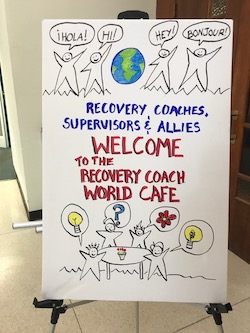
A Peer Recovery Coach (PRC) brings valuable lived experience with addiction and recovery, has completed specialized training and receives supervision, to effectively provide non-clinical recovery support to individuals in or seeking recovery.
If you are looking for Peer Recovery Coach trainings, click here.
If you do not have lived experience with addiction and recovery, find non-peer recovery support roles here.
What does a Peer Recovery Coach do?
- Offer hope, optimism, mentorship, and encouragement.
- Share information on multiple pathways and guide individuals as they discover and develop their own unique pathway of recovery.
- Provide support to navigate systems, establish community connections, and overcome barriers.
- Facilitate healthy decision-making, and promote self-advocacy.
- Use a strengths-based approach and best practices to work with participants to identify and achieve individualized, self-directed wellness goals.
- Some Recovery Coaches work with individuals over an extended period, to help them sustain their recovery and build recovery capital; others provide outreach, crisis intervention, engagement, and referral to encourage the individual to pursue a pathway of recovery.
- For more examples of Recovery Support activities click here.
For more details on the Recovery Coach Roles, see this document from the Transcom -Transformation Committee, a subcommittee of the State Mental Health Planning Council.
Where do Peer Recovery Coaches work?
- Outpatient settings
- Corrections (Jails, Prisons, Community)
- Primary Care
- Hospitals & Community Health Centers
- Mental Health settings
- Community Coalitions/Advocacy Organizations
- Police & Fire Departments
- Drug Courts & Probation Departments
- Employee Assistance Programs
- Pregnant and Parenting Programs
- Opioid Treatment Centers
- Private Practice
- Peer Recovery Support Centers
- Housing/Homeless Support Programs
- Emergency Departments
- Insurance Companies
- OB/GYN
- Recovery Support Services
What distinguishes Recovery Coaches for other peer or Recovery Support Roles?
The hallmark of a Peer Recovery Coach is lived experience with addiction and recovery and completion of specific training to support individuals seeking recovery from substance use.
Other peer support roles require lived experience, such as Certified Peer Specialists, who work in the mental health field and there are Recovery Support roles that do not require lived experience, such as Recovery Navigators and Recovery Specialists. For more information on peer and non-peer Recovery Support Roles, see this comparison table of peer support roles, and the Recovery Supports page.
Education: Generally, Peer Recovery Coach positions require a high school diploma or GED, but there are exceptions per employer.
Training: There are specific trainings required for people who want to become Peer Recovery Coaches, and general recovery support trainings open to all Recovery coaches and peer workers. The training schedule is on the Recovery Education Collaborative Trainings page. A high-level, printable summary of BSAS sponsored trainings which meet education requirements for Certification, Re-Certification and to become a Supervisor is available here.
Recovery Coach Academy is a five-day intensive training that provides individuals with the skills needed to guide, mentor and support anyone seeking to enter into or sustain long-term recovery from an addiction to alcohol or other drugs. Massachusetts is developing a peer recovery support workforce and this training is a fundamental component of providing quality, evidence-based peer support. RCA is a requirement for anyone interested in becoming a Certified Addiction Recovery Coach (CARC).
To attend the Recovery Coach Academy, you must:
- have lived experience of addiction and recovery
- have established personal recovery, with a minimum of 1 year of sustained recovery
- be working or hired as a Recovery Coach, working in a Peer Recovery Support setting or have been accepted to volunteer providing Recovery Coaching services
- have access to a qualified and supportive Recovery Coach supervisor
- complete an Application form
- if accepted, complete the Registration form.
If you are an administrator or community provider who would like to attend this training to enhance providing or overseeing recovery support services, but do not meet the criteria, please contact the Recovery Education Collaborative to discuss options.
Recovery Support Trainings
These trainings are designed for Recovery Coaches, other Peer Workers and anyone providing or managing recovery support programs, seeking to enhance education and skills in providing quality peer recovery support services. Some of these trainings meet CARC certification and recertification requirements. For more information go to Recovery Education Collaborative Trainings.
- Advocacy

- All Things Recovery
- Coaching Skills
- Equity, Inclusion & Diversity
- Ethical Considerations for Recovery Coaching
- Ethics for Recovery Coaches
- Medication Supported Recovery (MSR)
- Mental Wellness
- Motivational Interviewing
- Multiple Pathways
- Recovery Capital
- Self-Care
- Supervision of Recovery Coaches and other Peer Workers
In addition to formal trainings, MA DPH BSAS supports regional Recovery Coach and Recovery Coach Supervisor Learning Communities. For more information contact Danielle O’Brien.
For now, Certification is available for Recovery Coaches in Massachusetts. Individuals who submit all necessary education hours, and documented supervised work experience can apply for the exam to become a Certified Addiction Recovery Coach (CARC), which is administered by the independent, non-governmental Massachusetts Board of Substance Abuse Counselor Certification (MBSACC). A high-level, printable summary of trainings that meet education requirements for Certification, Re-Certification and to become a Supervisor is available here.
What are the Certified Addiction Recovery Coach (CARC) Education Requirements?
The following is an outline of the 60-hour education/training requirement for Certified Addiction Recovery Coach (CARC) and the BSAS/AdCare-sponsored trainings that meet these criteria. Completion of all trainings listed will satisfy the 60-hour CARC requirement. The training schedule is found on the Recovery Support Trainings page. Please review all CARC eligibility criteria on MBSACC website.
| Hours | Education Domain | BSAS/AdCare Training |
|---|---|---|
|
10 |
Advocacy | Recovery Coach Academy |
|
10 |
Mentoring/Education | Recovery Coach Academy |
| 10 | Recovery/Wellness Support | Recovery Coach Academy |
| 16 | Ethical Responsibility | Ethical Considerations for Recovery Coaching |
| Hours | Additional Training Domain | BSAS/AdCare Training |
|---|---|---|
| 3 | Cultural Competency | Equity, Inclusion and Diversity |
| 5 | Additions 101 | Addiction and Recovery 101 |
| 3 | Mental Health | Mental Wellness |
| 3 | Motivational Inteviewing (MI) | Motivational Inteviewing (MI) |
| 60 Total |
What else is required for Certified Addiction Recovery Coach (CARC)?
In addition to Education and training CEUs, there are other CARC requirements, which can be found on the Massachusetts Board of Substance Abuse Counselor Certification (MBSACC) website, including:
- Submitting a CARC application with an application fee
- A signed Supervisory Verification Form submitted by a qualified Recovery Coach Supervisor(s) attesting to 500 Hours of Supervised work experience
- Passing Recovery Coach Exam
Already CARC-Certified? Here are CARC Re-Certification Education Requirements
1) Ethics for Recovery Coaches
2) Multiple Pathways of Recovery
3) 18 hours of Elective CEUs in the domains of Advocacy, Mentoring & Education, and Recovery & Wellness Support, which can be met with any combination of the BSAS/AdCare Recovery Support Trainings listed below, which are designed to meet the needs of Recovery Coaches and other peer workers:
- Addiction and Recovery 101 (5)
- Advocacy (6)
- All Things Recovery (6)
- Coaching Skills (3)
- Equity, Inclusion and Diversity (4 for CARC recertification, meets the 3 for initial CARC)
- Medication Supported Recovery (5.5)
- Mental Wellness (3)
- Motivational Interviewing (3)
- Multiple Pathways (6)
- Recovery Capital (3)
- Self-Care in Peer Recovery Support (5.5)
There are other trainings offered by AdCare and elsewhere which meet these elective requirements. Click here for general Training & Events Calendar and check with MBSACC for eligible CEUs.
Peer Recovery Coaches can become:
- Certified Addiction Recovery Coach
- Senior Recovery Coach
- Recovery Coach Team Lead
- Recovery Coach Coordinator
- Recovery Coach Supervisor
- Recovery Coach Services Manager
- Recovery Support Program Manager
- Recovery Support Services Coordinator
Some organizations are exploring creating a tiered recovery support workforce, based on years of experience working as a Peer Recovery Coach.

Interested in becoming a Peer Recovery Coach Supervisor?
BSAS/AdCare provides trainings for those who are supervising Recovery Coaches and other Peer Workers:
All Things Recovery – This is the pre-requisite for the Supervisors training and is open to all agency leaders, program managers and Supervisors seeking to develop a deeper understanding of the peer workforce and peer supervision in a recovery-oriented system of care.
Supervising Recovery Coaches and other Peer Support Workers - This 2-day Supervisors training focuses on building the skills and competencies necessary for effective peer workforce supervision.
CARC applications and certain billing conditions require Recovery Coaches be supervised by a qualified supervisor who has completed this training.
Interested in becoming a Peer Recovery Coach Trainer? Contact Julia Ojeda, Recovery Support Services Coordinator at BSAS.